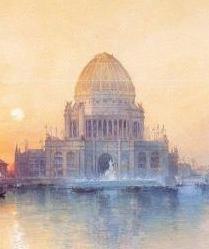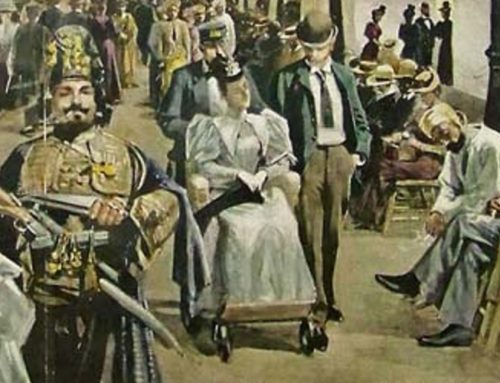The excerpt below, from The Century World’s Fair Book for Boys and Girls by Tutor Jenks (Century Co., 1893), describes the whaling bark Progress exhibited at the 1893 World’s Columbian Exposition in Chicago. The authentic whaling ship from New Bedford, Massachusetts, was moored in the South Pond and served as a floating museum of the fading whaling industry.

A view of the Anthropology and Ethnology exhibits along the South Pond of the 1893 World’s Fair, showing the whaling bark, Progress, floating museum. Bancroft, Hubert Howe The Book of the Fair. The Bancroft Company, 1893.
“But, speaking of whales, the next thing I saw was the one I want to tell you specially about. Near the shore there, in what they call the South Pond, was an old-fashioned vessel. I walked over toward it, and read the signs. They said it was a whaling-vessel, a regular old New Bedford whaler. You know about those ?
“I guess I do,” said Harry.
“I remember reading Peter, the Whaler, and a lot more books like it.”
“Well, at first I was n’t going in, for they charged a quarter, and there did n’t seem to be many going on board. I was afraid it was not good for anything, but at last I made up my mind to risk twenty-five cents on it. I bought my ticket and climbed the gang-plank. There were just two other men on board besides the sailor in charge.”
“‘Two other men’ is good,” remarked Harry.
“You know what I mean. When we got up on deck, the sailor came forward to speak his little piece. He said if we wanted to know how they caught whales he ‘d tell us. Then he went on with the whole thing, from ‘Thar she blows!’ down to the cutting up and trying-out of blubber.
“I had often read about it, but I tell you, Harry, it was different to see him hold up the harpoon and the lance, the gun for firing a big harpoon and all. And then we saw the vats for boiling the oil. And he said that out of the whale’s head they could dip up whole barrels of clear oil; but the whalebone was the thing they were after nowadays. He said they sometimes got thousands of dollars’ worth out of the mouth of one whale.
“After he finished telling about whaling, he invited us below, to see a collection of marine curiosities they had on board. It was a regular old-style ship, with the beams coming close down to your head. All around were cases of curious things—real sailors’ oddities: carved teeth and shells, swords from sword-fish, idols, weapons, tools whatever a sailor could collect. One thing I remember was a harpoon-head that had been bent and twisted around itself by a whale till it looked like a scrawl in a copy-book. Then we went forward to the forecastle, to see the queer little bunks where the men sleep.
“As I was coming away I bought a little book telling all about the old ship; and it is interesting, I tell you. I have n’t read it all yet, but one adventure of that ship the sailor told us about.
“She was out with a big fleet, more than thirty, and she was one of the six that got out from an ice-pack. Then a boat came along after, and reported the rest of the ships as wrecked. The Progress that’s the one I’m telling about and the other saved vessels threw all their valuable cargo over and took in the poor fellows from the ice. That was what I call square. You can read all about it later. Would n’t you like to?”
There was no answer. Philip turned to look at Harry more closely, and found that the tired boy had fallen fast asleep.





Leave A Comment